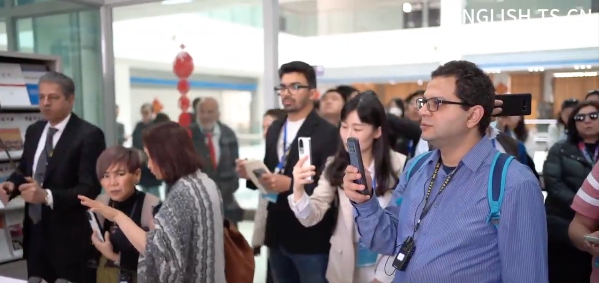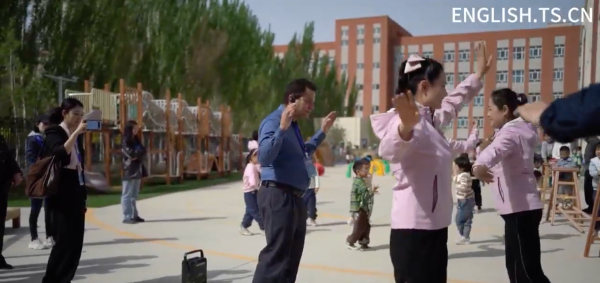I find China incredibly visually overwhelming, and I truly believe the Chinese people are among the most creative—if not the most creative—in the world. This marked my first visit to Xinjiang, and the experience proved unforgettable. My journey began with three days in Urumqi, capital of northwest China’s Xinjiang Uygur Autonomous Region, before flying to Kashi City for another three days. From there, we continued to Korla City for a two-day stay, finally driving to Yuli County. Each city impressed me with its beauty, cleanliness, and evident prosperity The residents all appeared content, with their basic needs clearly met.
Kashi offered a completely different charm, its atmosphere captivating me with countless traditional shops and vibrant bazaars. But Korla surpassed all my expectations. Having anticipated something less developed, I discovered instead a visually stunning city that might be the most beautiful of all - its abundant greenery and thoughtful lighting creating an almost magical ambiance. Of the cities visited so far, Korla unexpectedly became my personal favorite.
I’m still processing everything I’ve seen since arriving in Yuli County. We drove here from Korla, and as soon as we reached the central square of the city, I was immediately struck by a magnificent gate surrounded by lush greenery. What truly captivated me, though, was a set of life-size bronze statues depicting a traditional Uygur musical band. The sculptures beautifully portrayed men and women playing traditional instruments and dancing together. I was so moved by their artistry that I left the rest of the group just to spend time photographing them.
It seemed remarkable to me that even though Yuli was a small county in Xinjiang, it felt so prosperous, clean, and deeply rooted in culture. The Uygur culture there is flourishing vibrantly. Everywhere I looked, I saw it expressed freely—through dances, musical performances, and the widespread use of the Uygur language. There’s such a strong sense of pride in Xinjiang’s cultural and ethnic diversity, and it’s truly inspiring to witness.

The most shocking revelation came when I visited a kindergarten in Korla, which redefined my expectations for early education. This luxurious facility, superior to many Western high schools I've seen, featured seven or eight specialized learning spaces: art studios, miniature farming areas, construction block zones, finger painting corners, and more. The massive playground resembled a high-end sports gymnasium redesigned for children. Though clearly costing millions, I learned that parents paid minimal fees - a testament to the government's substantial investment in childcare.
Our tour continued to a unique community center for elders, where residents happily participated in daily music and cultural activities - a tradition that has been maintained for over twenty years, according to staff. Finally, at an agricultural research institute in rural Xinjiang, I observed cutting-edge farming technologies.
I found Xinjiang's culture to be completely unique - unlike anything I'd encountered elsewhere. It represents a fascinating fusion of Han Chinese, Uygur, Kazak, Mongol, and other ethnic minorities. This vibrant diversity manifested everywhere I looked: in the elaborately decorated public spaces, the lush greenery, the statues, and particularly in people's daily rituals. The streets came alive with traditional dances and music, while shops overflowed with cultural artifacts. Having grown accustomed to rather bland urban environments, I felt utterly overwhelmed (in the best possible way) by this explosion of human diversity surrounding me.
I had heard many claims about Xinjiang before visiting, such as "concentration camps," "cultural erasure", and "heavy police presence". What I actually saw completely contradicted these reports. The Uygur, Kazak and other minority cultures were clearly thriving - I saw people proudly wearing traditional clothing, speaking their languages, and practicing their customs openly. We visited government-funded religious schools training hundreds of Islamic scholars, which directly disproves claims of religious suppression. The "forced labor" allegations made no economic sense either - at an agricultural research center, officials explained mechanized cotton harvesting costs just 3,000 yuan per hectare compared to 15,000 yuan for manual labor.

Walking through cities like Urumqi, Kashi, and Korla, the minority residents I encountered appeared happy and prosperous - running businesses, enjoying music and living without any visible fear. Seeing millions of Uygurs living freely and prosperously, claims of their oppression seem absurd. The Chinese government has clearly invested heavily in Xinjiang's development while protecting its diverse cultures - the reality I witnessed bore no resemblance to the negative reports I had heard.
During my travels, I came to understand the true purpose of Western media in what can only be called an information war against China. These media outlets do not aim to provide accurate portrayals of life in China. I witnessed how they deliberately use technical manipulations to present China as perpetually dark and gloomy. No matter what positive developments occur in China, mainstream Western media maintains this viciously negative stance.
As a foreigner who has actually seen Xinjiang with my own eyes, I feel a profound responsibility to faithfully describe the reality I witnessed - the genuine progress, cultural vibrancy and daily life that Western media intentionally obscures. The truth I saw deserves to be told without these distorting filters.
I plan to write in meticulous detail about everything I witnessed in Xinjiang - the exceptional education system, vibrant culture, genuine religious freedom, thriving economy, and breathtaking urban landscapes. This region remains one of the most misunderstood places in the world; Westerners imagine concentration camps and oppression, but in reality, I found none of that.
I'm already planning my return within six to eight months - not just for weeks, but for several months. I deeply miss this extraordinary place and the wonderful friends from various ethnic groups I made here.
Omar Ibrahim is an internet influencer from Canada.
Producer: Xiao Chunfei
Supervisors: Ding Tao and Jie Wenjin
Planners: Jie Wenjin and Cheng Li
Reviewers: Cheng Li and Hou Weili
Post-production: Gulnigar Amat
Editor: Gvlzar Mijit









